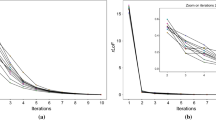Abstract
Nonlinear least squares iterative solver developed earlier by the author is applied for numerical solution of special system of multilinear equations arising in the problem of canonical tensor decomposition. The proposed algorithm is based on easily parallelizable computational kernels such as matrix-vector multiplications and elementary vector operations and therefore has a potential for a quite efficient implementation on modern high-performance computers. The results of numerical testing presented for certain examples of large scale dense and medium size sparse 3D tensors found in existing literature seem very competitive with respect to computational costs involved.
Supported by RFBR grant No.19-01-00666.
Access this chapter
Tax calculation will be finalised at checkout
Purchases are for personal use only
Similar content being viewed by others
References
Acar, E., Dunlavy, D.M., Kolda, T.G.: A scalable optimization approach for fitting canonical tensor decompositions. J. Chemometr. 25(2), 67–86 (2011)
Armijo, L.: Minimization of functions having Lipschitz continuous first partial derivatives. Pac. J. Math. 16(1), 1–3 (1966)
Bellavia, S., Gratton, S., Riccietti, E.: A Levenberg-Marquardt method for large nonlinear least-squares problems with dynamic accuracy in functions and gradients. Numer. Math. 140(3), 791–825 (2018)
Bellavia, S., Morini, B.: Strong local convergence properties of adaptive regularized methods for nonlinear least squares. IMA J. Numer. Anal. 35(2), 947–968 (2015)
Brent, R.P.: Algorithms for matrix multiplication (No. STAN-CS-70-157). Stanford University CA Department of Computer Science (1970)
Kaporin, I.E.: Esimating global convergence of inexact Newton methods via limiting stepsize along normalized direction. Rep. 9329, July 1993, Department of Mathematics, Catholic University of Nijmegen, Nijmegen, The Netherlands, 8p. (1993)
Kaporin, I.E.: The use of preconditioned Krylov subspaces in conjugate gradient type methods for the solution of nonlinear least square problems. (Russian) Vestnik Mosk. Univ., Ser. 15 (Computational Math. and Cybernetics) N 3, 26–31 (1995)
Kaporin, I.E., Axelsson, O.: On a class of nonlinear equation solvers based on the residual norm reduction over a sequence of affine subspaces. SIAM J. Sci. Comput. 16(1), 228–249 (1994)
Kaporin, I.: Using Chebyshev polynomials and approximate inverse triangular factorizations for preconditioning the conjugate gradient method. Comput. Math. Math. Phys. 52(2), 169–193 (2012)
Kaporin, I.: Preconditioned subspace descent methods for the solution of nonlinear systems of equations. In: Jacimovic, M., et al. (eds.) Proceedings of X International Conference on Optimization and Applications (OPTIMA 2019). Communications in Computer and Information Science (CCIS). Springer Nature Switzerland AG (2019)
Kaporin, I.: Preconditioned subspace descent method for nonlinear systems of equations. Open Comput. Sci. 10(1), 71–81 (2020)
Karimi, S., Vavasis, S.: Conjugate gradient with subspace optimization (2012). arXiv preprint arXiv:1202.1479v1
Kazeev, V.A., Tyrtyshnikov, E.E.: Structure of the Hessian matrix and an economical implementation of Newton’s method in the problem of canonical approximation of tensors. Comput. Math. Math. Phys. 50(6), 927–945 (2010)
Oseledets, I.V., Savostyanov, D.V.: Minimization methods for approximating tensors and their comparison. Comput. Math. Math. Phys. 46(10), 1641–1650 (2006)
Sterck, H.D., Winlaw, M.: A nonlinearly preconditioned conjugate gradient algorithm for rank-R canonical tensor approximation. Numer. Linear Algebra Appl. 22(3), 410–432 (2015)
Sterck, H.D., Miller, K.: An adaptive algebraic multigrid algorithm for low-rank canonical tensor decomposition. SIAM J. Sci. Comput. 35(1), B1–B24 (2013)
Yuan, Y.X.: Recent advances in numerical methods for nonlinear equations and nonlinear least squares. Numer. Algebra Control Optim. 1(1), 15–34 (2011)
Yu, L., Barbot, J.P., Zheng, G., Sun, H.: Compressive sensing with chaotic sequence. IEEE Signal Process. Lett. 17(8), 731–734 (2010)
Author information
Authors and Affiliations
Corresponding author
Editor information
Editors and Affiliations
Rights and permissions
Copyright information
© 2020 Springer Nature Switzerland AG
About this paper
Cite this paper
Kaporin, I. (2020). Nonlinear Least Squares Solver for Evaluating Canonical Tensor Decomposition. In: Olenev, N., Evtushenko, Y., Khachay, M., Malkova, V. (eds) Optimization and Applications. OPTIMA 2020. Lecture Notes in Computer Science(), vol 12422. Springer, Cham. https://doi.org/10.1007/978-3-030-62867-3_14
Download citation
DOI: https://doi.org/10.1007/978-3-030-62867-3_14
Published:
Publisher Name: Springer, Cham
Print ISBN: 978-3-030-62866-6
Online ISBN: 978-3-030-62867-3
eBook Packages: Mathematics and StatisticsMathematics and Statistics (R0)




